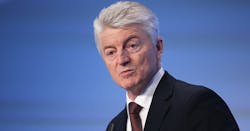Thyssenkrupp and Tata to Create Europe's No. 2 Steelmaker
Thyssenkrupp AG and Tata Steel Ltd. reached a tentative deal to merge their European steel businesses in a bid to create the region’s second-largest producer and tackle overcapacity in the industry.
The German and Indian companies have signed a memorandum of understanding for the joint venture to be named Thyssenkrupp Tata Steel, which will be equally owned by both parties, they said Wednesday. The transaction is expected to be finalized at the beginning of next year and will require the approval of the European Union.
The two foresee annual synergies of 400 million euros (US$480 million) to 600 million euros and the venture will be closer in size to Europe’s top producer, ArcelorMittal. Savings will be made in areas including capacity utilization, sales and administration and research and development. The companies flagged the possible loss of as many as 4,000 jobs, from a newly combined workforce of about 48,000.
Thyssenkrupp and Tata have been in tie-up talks for more than a year to drive the latest wave of consolidation as steelmakers seek ways to counter overcapacity and cut costs. While prices have recovered since early last year, the industry still faces a global glut caused by large Chinese exports and too much capacity around the world. Benchmark prices in Europe are about half the level they were in 2008, according to Metal Bulletin Ltd.
"We have always clearly stated that we believe in consolidation as the best solution for steel," Thyssenkrupp Chief Financial Officer Guido Kerkhoff told Bloomberg TV. “Now we’re taking another step in this journey to merge into an even bigger entity: Thyssenkrupp Tata Steel. The clear number two -- a clear number two that we want to form.”
Shares of Thyssenkrupp jumped as much as 5.3%, the most since February, and were up 3.5% as of 11:49 a.m. in Frankfurt. Tata Steel added 1.7% in Mumbai.
The venture would have a pro-forma revenue of about 15 billion euros annually and shipments of about 21 million metric tons of flat steel products, the companies said. No cash would change hands under the proposed combination. ArcelorMittal, which is currently in the process of buying Europe’s largest steel plant in Italy, has the capacity to make about 60 million tons a year.
“It’s clear that there are now two very sizable players being owned by two steel producers that are regarded as disciplined and professional,” said Ingo Schachel, an analyst at Commerzbank AG. “That should be useful for the European pricing environment.”
Investors have mostly welcomed the prospect of Thyssenkrupp finding a partner for its cyclical and capital-intensive steel operations. Still, Chief Executive Officer Heinrich Hiesinger, who is working to transform Germany’s top steelmaker into a more diversified industrial group, has faced some opposition from activists and unions. For Tata Steel, the move would let it focus more on its Indian market, where it plans to grow aggressively.
“Thyssenkrupp’s medium-term goal is to completely spin-out steel operations, leaving Thyssenkrupp as a near pure-play cap goods business,” said Seth Rosenfeld, an analyst at Jefferies International. “Today’s proposed merger structure is attractively ‘IPO-able’ in our view.”
The deal involves combining Tata’s plants in the Netherlands and U.K. with Thyssenkrupp’s German assets. The venture will be based in the Netherlands.
Dutch Prime Minister Mark Rutte called the deal “good news” in a Twitter post. “This strengthens the leading role of Tata Steel Ijmuiden as one of the most efficient and sustainable steel plants in the world,” he said.
Activist investor Cevian Capital AB may oppose the venture and instead favor a breakup of the German engineering company, people familiar with the matter said last week. Labor representatives, who have half of the seats on Thyssenkrupp’s supervisory board, have also expressed concern over job losses.
Tata Steel cleared a hurdle for the venture after a U.K. regulator approved a deal to solve a long-running pension standoff, which Thyssenkrupp CEO Hiesinger had said was potentially a major stumbling block to the combination.
Thyssenkrupp’s largest shareholder backed the planned combination.
"The Alfried Krupp von Bohlen and Halbach Foundation welcomes the planned cooperation between Thyssenkrupp AG and Tata, which has as its goal the long-term preservation and independent continuation of the company," the foundation, which owns more than 23%, said in a statement.
By Aaron Kirchfeld, Thomas Biesheuvel, Swansy Afonso and Siddharth Philip
About the Author
Bloomberg
Licensed content from Bloomberg, copyright 2016.
